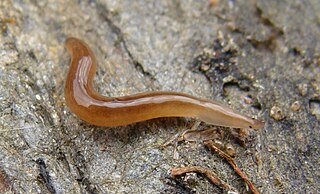
Dugesia is a genus of dugesiid triclads that contains some common representatives of the class Turbellaria. These common flatworms are found in freshwater habitats of Africa, Eurasia, and Australia. Dugesia is best known to non-specialists because of its regeneration capacities.
The Lake Pedder planarian is a species of invertebrate in the family Dugesiidae.
Romankenkius is a genus of freshwater planarian in the family Dugesiidae.

Geoplanidae is a family of flatworms known commonly as land planarians or land flatworms.

Dugesiidae is a family of freshwater planarians distributed worldwide. The type genus is Dugesia Girard, 1850.

Girardia is a genus of freshwater planarians belonging to the family Dugesiidae.

Schmidtea is a genus of freshwater triclads. Species of the genus Schmidtea are widely used in regeneration and developmental studies.

Dendrocoelidae is a family of freshwater tricladida flatworms that has a holarctic distribution.
Dugesia notogaea is a species of dugesiid triclad that inhabits freshwater bodies of north Queensland, Australia.
Dugesia sicula is a species of dugesiid triclad that lives in freshwater bodies of the Mediterranean Basin, where it is widely distributed. It has been reported from Sicily, Elba and Mallorca, Eivissa, Sardinia, Algeria, Tunisia, Morocco and Crete.

Kenkiidae is a family of freshwater triclads. Their species can be found sporadically in caves, groundwater, and deep lakes in Central Asia, Far East and North America.

Dimarcusidae is a family of triclads found mostly in freshwater habitats of caves, although at least one species, Rhodax evelinae, occurs in surface waters. Currently the family contains only seven species distributed in five genera, although the total number of species is thought to be much higher.
Neppia is a genus of dugesiid triclad that is found in South America, Subantarctic region, Africa, Tasmania and New Zealand.

Dugesia artesiana is a species of dugesiid triclad found in Queensland, Australia.
Cura pinguis is a species of dugesiid triclad found in Australia and New Zealand.

Geoplaninae is a subfamily of land planarians endemic to the Neotropical region. Members of this family are sometimes referred to as the Neotropical land planarians. However, one species, Obama nungara has been introduced in Europe.

Dugesia subtentaculata is a species of planarian that inhabits the freshwater of Southern France, several localities on the Iberian Peninsula, Mallorca, Morocco and Algeria.

Rhynchodeminae is a subfamily of land planarians with a worldwide distribution.
Novibipalium is a genus of land planarians of the subfamily Bipaliinae.
Amagase Dam is an earthen dam located in Saga Prefecture in Japan. The dam is used for agriculture. The catchment area of the dam is 1.6 km2. The dam impounds about 6 ha of land when full and can store 532 thousand cubic meters of water. The construction of the dam was started on 1972 and completed in 1982.










